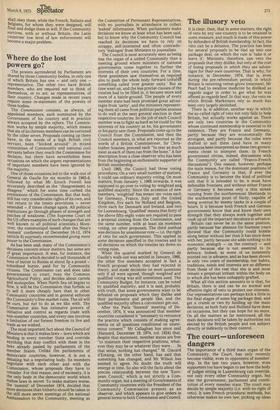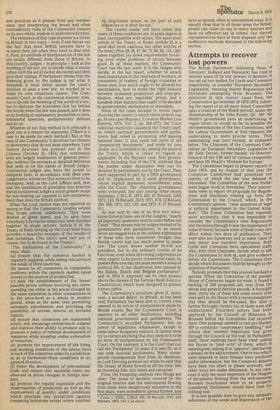The importance of a third main organ of the Community,
the Court, has only recently become visible, even to opponents of membership. In the last two years, however, even supporters too have begun to see how the body of judges sitting in Luxembourg can override, not only every other Community organ, but also the government, parliament and constitution of every member state. The court may decide by simple majority (i.e. with no right of veto). It uses French procedural methods, but otherwise makes its own law, picking up ideas and practices as it pleases from any member state, and interpreting the broad and often contradictory rules of the Community treaties as its own whim, wisdom or preference dictates. The existence of that type of power is a threat to Britain in two ways even if one leaves out
the fact that most British lawyers have to re-learn their job when they have to deal with it. First, its methods of interpretation of the law are totally different from those of Britain. In this country, judges in principle look at the wording of the law, try to decide what it means (often with the aid of earlier decisions) and then give their rulings. If Parliament thinks that the meaning given by the judges is not what it intended, it must either accept the court's decision or pass a new law, so worded as to make its own intentions clearer. The Community Court, in the continental manner, tries, not to decide the meaning of the words of a law, but to discover the intentions that lay behind the words when the law was passed, and it does so by looking at explanatory preambles to laws, ministerial speeches, parliamentary debates and so on.
Whether or not that method is in principle a good one is a matter for argument. (There is a case to be made for each method.) But in the case of the Community it involves two threats to democracy that do not exist elsewhere. Lord Justice Scarman has pointed out in the Listener (October 31, 1974) that continental laws are largely statements of general principles, without the attempts at detailed definition that seek to tie the hands of British judges. Continental judges also have the power to complete laws, in accordance with their own judgements, whenever that seems to them to be necessary. And, as the Lord JirKtice said, that and the translation of principles into practice leaves continental judges a much greater scope for law-making (as opposed to law-interpretation) than does the British method.
What the Lord Justice was not reported as saying is that the Community treaties extend that scope almost indefinitely. They were drafted at great speed, and, to save time, everybody's favourite intentions were bundled together in single articles. Article 3 of the Treaty of Paris (setting up the Coal-Steel Pool) provides a beautiful example of the results of that technique. (The italics used here are, of course, not to be found in the Treaty.) "The institutions of the Community," it says,"shall
(a) ensure that the common market is regularly supplied, while taking into account the needs of third countries;
(b) assure to all consumers in comparable positions within the common market equal access to the sources of production;
(c) seek the establishment of the lowest possible prices without involving any corresponding rise either in the prices charged by the same enterprise in other transactions or in the price-level as a whole in another period, while at the same time permitting necessary amortisation and providing the possibility of normal returns on invested capital; (d) ensure that conditions are maintained which will encourage enterprises to expand and improve their ability to produce and to promote a policy of rational development of resources while avoiding undue exhaustion of resources; (e) promote the improvement of the living and working conditions of the labour force in each of the industries under its jurisdiction so as to harmonizethose conditions in an upward direction; (f) foster the development of international trade and ensure that equitable limits are observed in prices charged in foreign markets; (g) promote the regular expansion and the modernisation of production as well as the improvement of quality, under conditions which preclude any protection against competing industries except where justified by illegitimate action on the part of such industries or in their favour."
The careful reader will have noted that many of these conditions are, in some degree at least, incompatible with others. The equivalent article of the Treaty of Rome (article 2) is a good deal more cautious, but other articles of the treaty (Nos 29, 36, 67, 68, 75, 90, 92, 118, 120), taken together, lay down requirements involving even wider problems of choice between goals. In all these matters, the Community Court has the last word. It is the Judges who decide, in the last resort, whether to attach most importance to the interests of workers, of consumers, of traders, of foreign countries or home ones, how much ought to be allowed for amortisation, how to strike the right balance between increased production and over-production, what are 'equitable' prices, and a hundred other matters that ought to be decided by governments, parliaments or managers.
Some of the cases decided in recent years illustrate the extent to which these powers can go. In one case (Reyners, Common Market Law Reports, 1974, Vol. 2, pp. 305-337), the Court ruled out restrictive clauses in the Treaty itself, on which national governments and parliaments had relied in promoting and passing national laws. It also ruled out parts of the "preparatory documents" and made its own choice, as it is entitled to do, among the parts of the Treaty which it chose to regard as applicable. In the Reyners case, four governments, including that of the UK, asserted that the matter under discussion was one for decision by parliaments, not by the Court. They were supported in part by a fifth government and by implication by a sixth government, whose explicit statement nevertheless sided with the Court. The objecting governments were overruled. See also among other recent examples, C.M.L.R. 1973, 501, 81 Recueil, 1245; 1971, 123, 16 Recueil, 1213; 1971, 674, 12 Recueil, 293, 302; 1971, 123, 132; and 1972, 4, 17 Recueil, 811.
As was said by one of its first two Advocates-General (now one of the Judges), "nearly all important questions tend to come before the Court." That means rule by judges instead of by governments and parliaments, to an extent never envisaged even in the wildest nightmares of those who have sometimes thought that British courts had too much power to make law. The court shows neither nor prejudice, but in the ordinary course of its functions, even when delivering judgements on what appear to be purely commercial cases, its powers flow over into the most sensitive areas of political life. It has disallowed laws passed by the Italian, Dutch and Belgian parliaments*, and in 1974 it expressly set its own powers above the clauses of the German Basic Law (i.e. Constitution) which were designed to protect human rights.
The Community's structure gives it, moreover, a second defect. In Britain, as has been said, Parliament has been able to correct what seemed to be errors of interpretation made by British courts. But the Community Court is superior to all other institutions, including national governments and parliaments. The Community's so-called Parliament has no power of legislation whatsoever, except in some minor budgetary matters. It cannot even try to correct anything that may seem to it to be an error of interpretation by the Community Court. On the contrary, it is the Court that can call the 'Parliament' to order if it sees fit, as it
can with national parliaments. Many unsuspected consequences flow from its decisions, as Lord Denning pointed out when he said that the Treaty of Rome flowed in all the time, like an incoming tide, into inlets and estuaries.
From the foregoing analysis two things are clear. The areas of decision covered by the original treaties and the instruments flowing from them were dangerously extensive in the first place, were intended to spread further, and
have so spread, often in unsuspected ways. It is equally clear that in all those areas the British people can claim no say in many matters and have no effective say in others. Our elected representatives have at their disposal only the ineffective methods discussed in the following section.











































 Previous page
Previous page